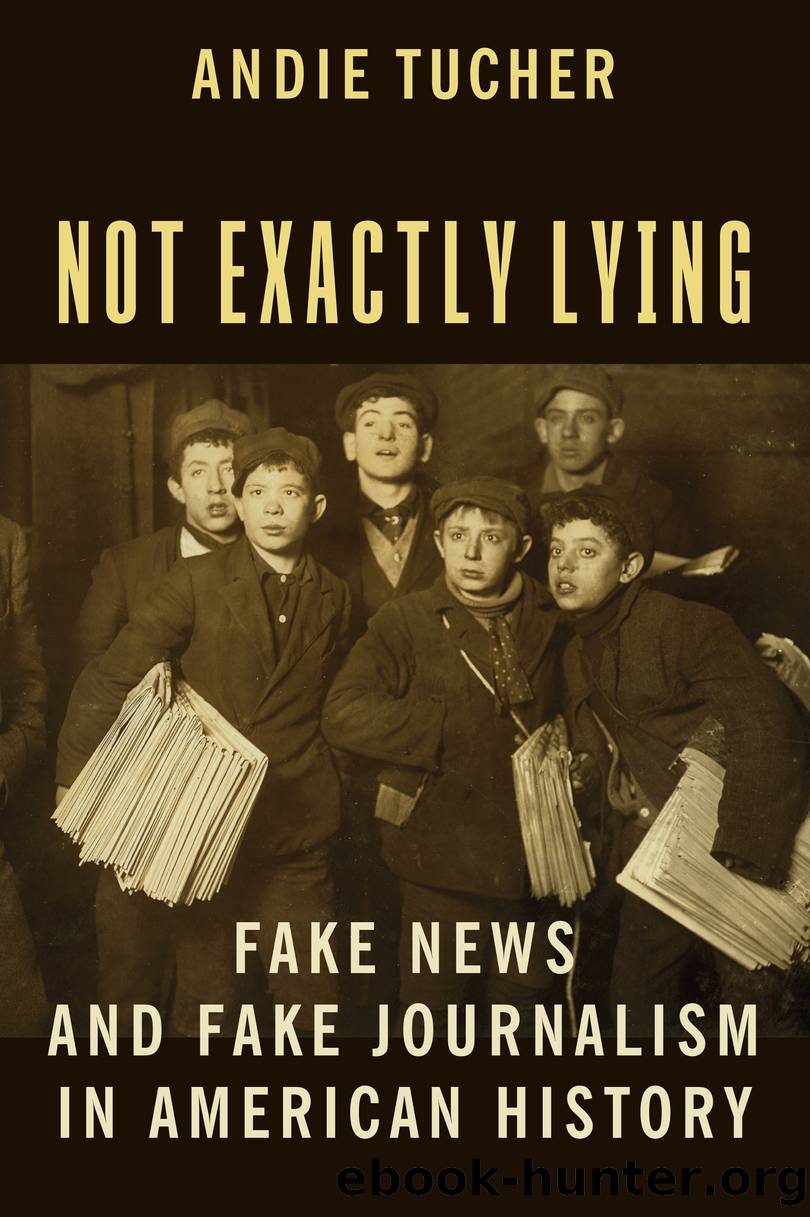Not Exactly Lying by Andie Tucher

Author:Andie Tucher
Language: eng
Format: epub
Publisher: Columbia University Press
8
âSO GODDAMN OBJECTIVEâ
Much of what Senator Joseph R. McCarthy of Wisconsin said about himself was embellished, exaggerated, or fake, starting with his nickname (although âTailgunner Joeâ had avidly volunteered for a number of aerial combat missions during World War II, his official assignment was as a deskbound marine intelligence officer) and his heroic stories about the âwar woundâ that he had actually sustained in a shipboard hazing ritual.1 Most of what the Republican said about Communists overrunning the State Department, the army, the Democratic Party, and the press was recklessly fabricated out of whole cloth, solely to exploit Cold War fears and earn himself power, attention, and reelection. Most of what he claimed about immense conspiracies and decades of treason was a purposeful lie. But his nearly five yearsâ worth of vicious assaults, verbal and occasionally physicalâin the cloakroom of an exclusive Washington club, he either slapped the muckraking columnist Drew Pearson in the face or kneed him in the groinârepresented not just a low point for the U.S. Senate but also for parts of the U.S. press. And it posed an essential question: What happens when one side plays by the old rules and the other side simply fakes it?
Senator McCarthy was a cunning thug. His deployment of innuendo, ridicule, and contempt, his blithe trampling of legal and constitutional constraints, his gaudy bullying, and his crass exploitation of his public office made it impossible for journalists to ignore him, and the conventional wisdom holds that journalists actively enabled his rise with coverage that was both overlavish and uncritical. In fact, however, the journalistic landscape was more varied than that story suggests.
Plenty of news people and organizationsâincluding Colonel Robert McCormickâs ultraconservative Chicago Tribune, the San Diego Union, the Hearst press, and Hearstâs widely syndicated columnist Westbrook Peglerâsupported McCarthy openly until the end, or near to it. Plenty of othersâDorothy Schiffâs New York Post, the Milwaukee Journal, Edward R. Murrow of CBS, James Reston, Richard Rovere, Drew Pearson, the syndicated columnists Stewart Alsop and Joseph Alsop, the cartoonist Herblock, and others among the nationâs most powerful journalistic voicesâcould be equally open with their dismay, in editorials if not in news columns. Established journals of opinion such as the Progressive, the Nation, and the New Republic did not hesitate to weigh in against the senator, and even some smaller newspapers, notably the Capital Times of Madison in the senatorâs home state, routinely ran critical pieces. Thus, another bit of conventional wisdom, that no journalist dared stand up to McCarthy until the heroic Murrow showed the world what television could do, pays tribute to the wallop of the new visual medium, but it doesnât stand up to scrutiny.
But many news organizations did cover McCarthy with the carefully balanced, fact-centered, disinterested approach characterized as âobjectivityâ afforded to all their coverage of Establishment institutions, often relying uncritically on information from official sources and treating anything related to national security with marked deference. It was the adherence to those traditional professional values, as critics argued at the time and afterward, that was exactly the problem.
Download
This site does not store any files on its server. We only index and link to content provided by other sites. Please contact the content providers to delete copyright contents if any and email us, we'll remove relevant links or contents immediately.
Asking the Right Questions: A Guide to Critical Thinking by M. Neil Browne & Stuart M. Keeley(5739)
Autoboyography by Christina Lauren(5217)
Eat That Frog! by Brian Tracy(4499)
Dialogue by Robert McKee(4372)
Sticky Fingers by Joe Hagan(4171)
Journeys Out of the Body by Robert Monroe(3603)
Annapurna by Maurice Herzog(3454)
Full Circle by Michael Palin(3430)
Schaum's Quick Guide to Writing Great Short Stories by Margaret Lucke(3361)
Elements of Style 2017 by Richard De A'Morelli(3331)
The Art of Dramatic Writing: Its Basis in the Creative Interpretation of Human Motives by Egri Lajos(3048)
Atlas Obscura by Joshua Foer(2940)
Why I Write by George Orwell(2933)
The Diviners by Libba Bray(2918)
The Fight by Norman Mailer(2915)
In Patagonia by Bruce Chatwin(2905)
The Mental Game of Writing: How to Overcome Obstacles, Stay Creative and Productive, and Free Your Mind for Success by James Scott Bell(2888)
Venice by Jan Morris(2557)
The Elements of Style by William Strunk and E. B. White(2458)
